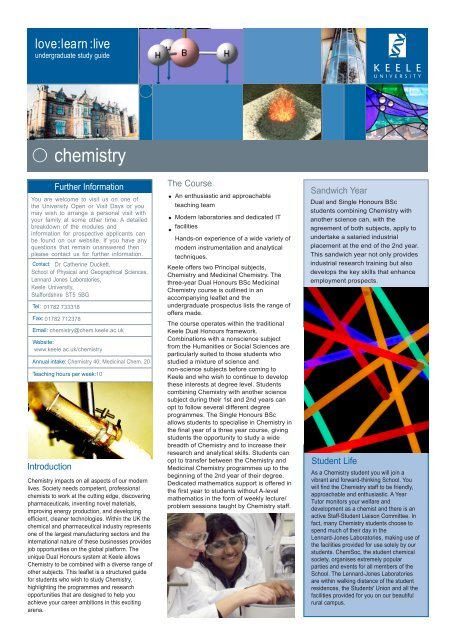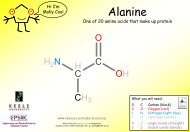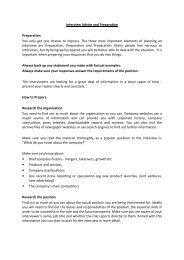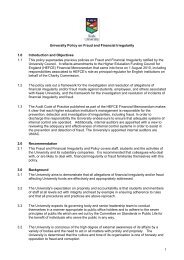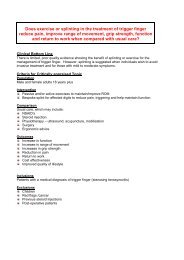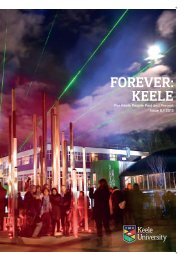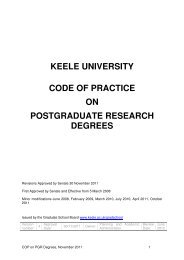Chemistry leaflet - Keele University
Chemistry leaflet - Keele University
Chemistry leaflet - Keele University
Create successful ePaper yourself
Turn your PDF publications into a flip-book with our unique Google optimized e-Paper software.
love:learn :live<br />
undergraduate study guide<br />
Introduction<br />
chemistry<br />
Further Information<br />
You are welcome to visit us on one of<br />
the <strong>University</strong> Open or Visit Days or you<br />
may wish to arrange a personal visit with<br />
your family at some other time. A detailed<br />
breakdown of the modules and<br />
information for prospective applicants can<br />
be found on our website. If you have any<br />
questions that remain unanswered then<br />
please contact us for further information.<br />
Contact: Dr Catherine Duckett,<br />
School of Physical and Geographical Sciences, ,<br />
Lennard Jones Laboratories,<br />
<strong>Keele</strong> <strong>University</strong>,<br />
Staffordshire ST5 5BG<br />
Tel: 01782 733318<br />
Fax: 01782 712378<br />
Email: chemistry@chem.keele.ac.uk<br />
Website:<br />
www.keele.ac.uk/chemistry<br />
Annual intake: <strong>Chemistry</strong> 40; Medicinal Chem. 20<br />
Teaching hours per week:10<br />
<strong>Chemistry</strong> impacts on all aspects of our modern<br />
lives. Society needs competent, professional<br />
chemists to work at the cutting edge, discovering<br />
pharmaceuticals, inventing novel materials,<br />
improving energy production, and developing<br />
efficient, cleaner technologies. Within the UK the<br />
chemical and pharmaceutical industry represents<br />
one of the largest manufacturing sectors and the<br />
international nature of these businesses provides<br />
job opportunities on the global platform. The<br />
unique Dual Honours system at <strong>Keele</strong> allows<br />
<strong>Chemistry</strong> to be combined with a diverse range of<br />
other subjects. This <strong>leaflet</strong> is a structured guide<br />
for students who wish to study <strong>Chemistry</strong>,<br />
highlighting the programmes and research<br />
opportunities that are designed to help you<br />
achieve your career ambitions in this exciting<br />
arena.<br />
The Course<br />
An enthusiastic and approachable<br />
teaching team<br />
Modern laboratories and dedicated IT<br />
facilities<br />
Hands-on experience of a wide variety of<br />
modern instrumentation and analytical<br />
techniques.<br />
<strong>Keele</strong> offers two Principal subjects,<br />
<strong>Chemistry</strong> and Medicinal <strong>Chemistry</strong>. The<br />
three-year Dual Honours BSc Medicinal<br />
<strong>Chemistry</strong> course is outlined in an<br />
accompanying <strong>leaflet</strong> and the<br />
undergraduate prospectus lists the range of<br />
offers made.<br />
The course operates within the traditional<br />
<strong>Keele</strong> Dual Honours framework.<br />
Combinations with a nonscience subject<br />
from the Humanities or Social Sciences are<br />
particularly suited to those students who<br />
studied a mixture of science and<br />
non-science subjects before coming to<br />
<strong>Keele</strong> and who wish to continue to develop<br />
these interests at degree level. Students<br />
combining <strong>Chemistry</strong> with another science<br />
subject during their 1st and 2nd years can<br />
opt to follow several different degree<br />
programmes. The Single Honours BSc<br />
allows students to specialise in <strong>Chemistry</strong> in<br />
the final year of a three year course, giving<br />
students the opportunity to study a wide<br />
breadth of <strong>Chemistry</strong> and to increase their<br />
research and analytical skills. Students can<br />
opt to transfer between the <strong>Chemistry</strong> and<br />
Medicinal <strong>Chemistry</strong> programmes up to the<br />
beginning of the 2nd year of their degree.<br />
Dedicated mathematics support is offered in<br />
the first year to students without A-level<br />
mathematics in the form of weekly lecture/<br />
problem sessions taught by <strong>Chemistry</strong> staff.<br />
Sandwich Year<br />
Dual and Single Honours BSc<br />
students combining <strong>Chemistry</strong> with<br />
another science can, with the<br />
agreement of both subjects, apply to<br />
undertake a salaried industrial<br />
placement at the end of the 2nd year.<br />
This sandwich year not only provides<br />
industrial research training but also<br />
develops the key skills that enhance<br />
employment prospects.<br />
Student Life<br />
As a <strong>Chemistry</strong> student you will join a<br />
vibrant and forward-thinking School. You<br />
will find the <strong>Chemistry</strong> staff to be friendly,<br />
approachable and enthusiastic. A Year<br />
Tutor monitors your welfare and<br />
development as a chemist and there is an<br />
active Staff-Student Liaison Committee. In<br />
fact, many <strong>Chemistry</strong> students choose to<br />
spend much of their day in the<br />
Lennard-Jones Laboratories, making use of<br />
the facilities provided for use solely by our<br />
students. ChemSoc, the student chemical<br />
society, organises extremely popular<br />
parties and events for all members of the<br />
School. The Lennard-Jones Laboratories<br />
are within walking distance of the student<br />
residences, the Students' Union and all the<br />
facilities provided for you on our beautiful<br />
rural campus.
Course Structure<br />
The purpose of the 1st and 2nd year modules is<br />
to equip students with the knowledge base<br />
required for advanced studies in <strong>Chemistry</strong>.<br />
Specialisation is possible in the 3rd year;<br />
students choose a research project in a specific<br />
area and the Research Topics module covers<br />
areas in which the academic staff have research<br />
expertise. Each module is designed to develop<br />
analytical, problem solving and presentation<br />
skills. In addition, Induction and Study Skills<br />
Sessions provide advice on topics such as notet<br />
a k i n g , s t u d y i n g , l a b o r a t o r y s a f e t y , o r a l<br />
presentations and preparation for examinations.<br />
Research projects are an integral part of the<br />
Dual and Single Honours BSc courses. All<br />
students carry out projects in the research<br />
laboratories under the direct supervision of an<br />
academic member of staff. Students work<br />
alongside postgraduate and postdoctoral<br />
researchers, providing an opportunity to innovate<br />
and demonstrate their independence as chemical<br />
researchers.<br />
In the 1st and 2nd years students take two<br />
<strong>Chemistry</strong> modules per 12-week semester. Each<br />
module consists of 24 hours of lectures and 36<br />
hours of associated practical work and problem<br />
classes.<br />
Autumn Semester<br />
Practical courses are designed to complement the<br />
lecture material and make full use of the laboratory<br />
and IT facilities available. Problem classes provide<br />
an informal forum where problems arising from the<br />
lectures can be discussed with a member of staff<br />
and other students. In both, further aspects of<br />
<strong>Chemistry</strong> are explored and the links between<br />
various disciplines reinforced.<br />
In the 3rd year, Dual Honours BSc <strong>Chemistry</strong><br />
students take two 20-lecture modules in the<br />
Autumn semester and select four 5-lecture topics<br />
in the Research Topics in <strong>Chemistry</strong> module in the<br />
Spring semester. The Research Project is worth<br />
one module and is carried out over one semester.<br />
Single Honours BSc students take three modules<br />
in the Autumn semester, three in the Spring and<br />
carry out a Single Honours Research Project over<br />
two semesters.<br />
Modules in the 1st and 2nd years are assessed by<br />
examination, class tests and a variety of practical<br />
assessments designed to develop your subjectspecific<br />
and transferrable skills. For Dual and<br />
Single Honours BSc <strong>Chemistry</strong> courses the marks<br />
from the 2nd year count one third towards the final<br />
degree classification. In the 3rd year modules are<br />
assessed continuously and by examination, while<br />
the research project is assessed by dissertation,<br />
laboratory performance and oral exam.<br />
Spring Semester<br />
BSc Single Honours<br />
<strong>Chemistry</strong><br />
Students combining <strong>Chemistry</strong> with another<br />
science or Mathematics can specialise in<br />
<strong>Chemistry</strong> during the 3rd year. Students<br />
take three taught modules in the Autumn<br />
semester and three in the Spring semester:<br />
Advanced Chemical Analysis develops skills<br />
in analytical problem solving and state-ofthe-art<br />
analytical laboratory techniques. The<br />
two Research Topics modules give breadth<br />
to the Spring semester and Single Honours<br />
students carry out one research project that<br />
equates to a double module.<br />
Year 1 Electrons in Atoms and Molecules Making Organic Molecules<br />
The Physical Basis of<br />
Chemical Processes<br />
Navigating the Periodic Table<br />
Year 2 Organic Synthesis and Chirality Organometallic <strong>Chemistry</strong><br />
Spectroscopic Methods<br />
Physical <strong>Chemistry</strong><br />
Year 3 Synthesis, Kinetics and Mechanism Research Topics in <strong>Chemistry</strong><br />
Solids, Surfaces and Catalysis<br />
Dual Honours Research Project<br />
Additional Modules for Single Honours Programmes<br />
Biologically Important Molecules<br />
Single Honours Research Project<br />
Research within the School<br />
Single Honours Research Project<br />
Research Topics in Biological and<br />
Medicinal <strong>Chemistry</strong><br />
Advanced Chemical Analysis<br />
All members of academic staff are engaged in research across the breadth of the chemical<br />
sciences. The main areas of research activity include Green <strong>Chemistry</strong> and Clean Technology,<br />
Fuel Cells, Catalysis, Environmental Science, Advanced Materials, Medicinal <strong>Chemistry</strong>, Chemical<br />
Ecology, Forensic and Pharmaceutical Analysis, Computational <strong>Chemistry</strong>, Synthetic <strong>Chemistry</strong><br />
and Photochemistry. Undergraduate project students have access to a wide variety of research<br />
equipment within the School, including FT-IR, UV/Vis, Fluorescence and FT-NMR spectrometers,<br />
GC, HPLC, SFC & ICP-OES, ICP-MS, LC-MS, GC-MS chromatography, catalyst testing<br />
apparatus, Laser Flash Photolysis, Raman microscopy, Scanning Tunnelling & Atomic Force<br />
Microscopy, X-ray Diffraction & Microfocus instruments. Over recent years our research income<br />
has been impressive, with the award of substantial funding from Government Research Councils,<br />
the European Union, Charities and a large number of industrial partners.<br />
Laboratory Facilities<br />
In recent years we have invested substantial funds (in excess of £3 million) refurbishing our<br />
Synthetic and Analytical Laboratories, creating a new suite of tutorial rooms, offices and<br />
refurbished teaching laboratory space and furnishing the laboratories with modern state-of-the-art<br />
analytical and spectroscopic instrumentation. In addition, work is underway to develop a new £4<br />
million multi-user teaching laboratory for Autumn 2009. This exciting new development will result<br />
in three large, exceptionally well equipped laboratories for the delivery of chemical sciences,<br />
boasting one of the best science teaching facilities in the country.<br />
RSC Course Recognition<br />
All BSc Dual Honours and Single Honours (Major) courses in <strong>Chemistry</strong> and in Medicinal<br />
<strong>Chemistry</strong> are recognised by the Royal Society of <strong>Chemistry</strong>. Graduates are eligible for admission<br />
to Associate Member of the RSC (AMRSC) on graduation.<br />
Career Opportunities<br />
<strong>Keele</strong> graduates are uniquely placed to<br />
develop careers by combining the<br />
a n a l y t i c a l , p r o b l e m s o l v i n g a n d<br />
numerical skills acquired from our<br />
c o u r s e s w i t h a k n o w l e d g e o f t w o<br />
subject areas. Diverse opportunities<br />
e x i s t i n t h e c h e m i c a l a n d<br />
p h a r m a c e u t i c a l i n d u s t r i e s , i n<br />
biotechnology and natural resource<br />
management, ceramics and materials<br />
p r o c e s s i n g , a n d a n a l y s i s a n d<br />
instrumentation design. Most recently, a<br />
graduate with a Dual Honours BSc in<br />
<strong>Chemistry</strong> and English gained a senior<br />
position within a multinational company<br />
d e v e l o p i n g n o v e l p o l y m e r s a n d<br />
coatings. A number of students each<br />
year enter the teaching profession<br />
where their broad scientific knowledge<br />
places them ideally to teach crossdisciplinary<br />
GCSE science and A-<br />
levels. A significant proportion of Dual<br />
Honours students go on to higher<br />
degree courses or research in either<br />
subject. In recent years approximately<br />
one third of our graduates have chosen<br />
to continue onto higher degrees both<br />
here at <strong>Keele</strong> and at other universities.


